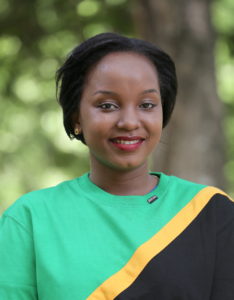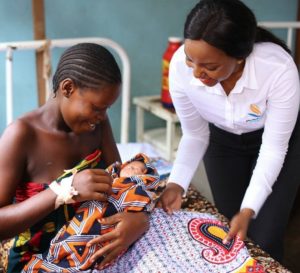 Doris Mollel was a 900-gram premature baby who was born 28 years ago. A first born twin, who grew up to become a beauty queen, she later on took her passion for giving back to the community and chose to support fellow premature babies. She launched the Doris Mollel Foundation with the main goal of reducing death rates for premature babies. Doris’ dream is to touch all countries within East Africa.
Doris Mollel was a 900-gram premature baby who was born 28 years ago. A first born twin, who grew up to become a beauty queen, she later on took her passion for giving back to the community and chose to support fellow premature babies. She launched the Doris Mollel Foundation with the main goal of reducing death rates for premature babies. Doris’ dream is to touch all countries within East Africa.
Her Foundation focuses on raising awareness for premature babies, furnishing hospitals with equipment to support their survival while in hospital, foster the creation of friendly policies to support parents, and also foster research and advocacy.
Understanding that she was only lucky to survive, coupled with the fact that prematurity is the leading cause of death for new born under five – contributing to approximately 40% of deaths in newborns under five – pushed her to jump and become a voice for preterm babies. Since no one had committed to stand for the rights of premature babies, Doris felt obligated to take a stand as she did not want these babies to continue to be viewed as the left behind.
What are you most proud of?
I am proud to have touched the lives of more than 4,500 premature babies in Tanzania. This is my true proud legacy as well as adding up on the request to our Government to extend parental leave for parents with premature babies.
What do you wish you had done differently?
Well, what I wish is that I had started the Foundation earlier. I feel like by 2015 we had already lost so many preterm babies that could have been saved, but all is well.
What are some of the biggest challenges you have faced? How did you overcome them? What are some of the lessons learnt?
The main challenge I faced was addressing the knowledge gap on prematurity. Some take preterm as a curse; some take mothers of preterm babies as disabled and as a result, these women are highly discriminated against. Very few people understood what the Foundation was addressing but today, we thank God. With the help of the Ministry of Health, we managed to improve knowledge. Now, even men have the guts to say: “I was born a preemie!” This made me learn that despite the hardships, I should just keep going and the people will catch me on the way. I feel better knowing that now, some way, somehow, people are more aware. My big work now, is to invest that knowledge in rural areas, especially in the most hard to reach areas.
 What are some of the opportunities you see for women in health on the African continent?
What are some of the opportunities you see for women in health on the African continent?
I see women leading in the future. Technology advancements are accelerating rapidly; therefore, we have to prepare girls to be ready for the fast paced world that we are moving into.
What advice do you have for other women in health?
My advice and request to women is that, just like a mother decides to get pregnant and nurses the baby until he or she is fully ready to be responsible, they should take one young girl and walk with her until she succeeds. This way, we will have a future filled with many influential women and problem solvers in Africa.

Leave a Reply